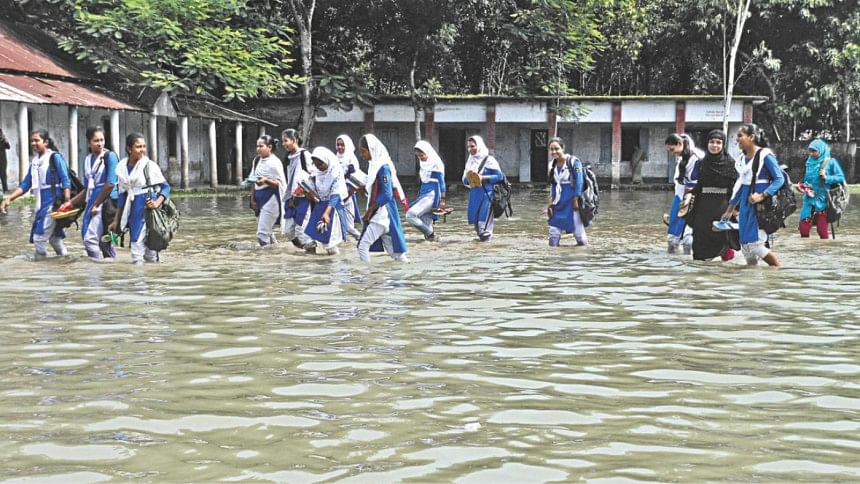A gathering storm

The change in seasons is devastating, especially when it comes to river flooding and river erosion in Bangladesh.
Nine-year-old Badrul from Pirojpur testifies to the consequences of unseasonal river flooding. "The waters engulfed our school and broke the (classroom) floor. I went to close the window but fell into the hole and fractured my arm," he reminisces.
Over 19 million children, spread across 20 of Bangladesh's 64 districts, are exposed to the most hazardous consequences of short- or long-term climate change. And of this, nearly 12 million live in and around river systems that are at increased risk of producing life-threatening floods.
Unicef's latest report, "A Gathering Storm", puts the problem in clear context. The voluminous testimony gathered from many parts of the country covers a parent who had to move eight times in as many years because of river erosion and flooding; a single mother forced to put her child up for adoption after her home was lost to flooding; and a child lured into prostitution after her parents' home was destroyed in a flood.
The narratives almost unanimously point to one extremely worrying trend: the seasons in Bangladesh are changing, often resulting in warmer and wetter winters with more unseasonal flooding.
The interviews also include troubling accounts of child migrants driven out of their homes and schools—and displaced to overcrowded city slums—due to extreme weather conditions.
For many, especially those who lack basic skills, survival in these harsh surroundings means taking on low-paid, hazardous and exploitative work. For girls, it may mean becoming a child bride or even a sex worker.
These individuals are not victims of climate change alone. They come from communities whose lives are already shaped by poverty and inequality. For them a changing climate is the factor that pushes them over the edge, leaving them unable to keep their children properly housed, fed, healthy and educated.
The new report paints an extremely disturbing picture. The problem is not just one of unseasonal flooding caused by swollen rivers. It is estimated that about 4.5 million Bangladeshi children live in coastal areas that are regularly struck by powerful cyclones.
A further three million children live in-land, where farming communities suffer increasing periods of drought.
While these and other climate-related risks facing children are escalating, they are not new. The Bangladesh Climate Change Strategy and Action Plan clearly articulated them in 2009.
Since then, the strategy has been the framework for impressive progress made by the government, its partners, society and young people towards building climate resilience.
Huge investments in disaster preparedness and risk reduction have paid off, and long years of experience with aggressive forces of nature have helped Bangladeshis develop admirable powers of resilience.
One measure of the country's success has been a dramatic reduction in mortality rates during cyclones in recent decades.
But much more must be done to avert the danger that climate change poses to Bangladesh and its long-term development goals. As the country embarks on the plan's second phase in 2019, it is imperative to devote greater attention and resources to shielding children from the effects of climate change.
To that end, Unicef calls for concerted and sustained efforts—led by the government with the active participation of the international community and other partners—in the areas of health, education, nutrition, WASH, child and social protection, community engagement and accountability, as well as youth participation.
Our calls-to-action also include an appeal to make sure that cash grants and other quality social services reach Bangladeshi families in the immediate aftermath of climate-related shocks. In addition, support must be available to migrant families when they arrive in Dhaka and other major cities.
The threat continues to mount. Only in October 2018, the Intergovernmental Panel on Climate Change released its most extensive warning yet about the imminent dangers that rising global temperatures pose to humankind.
In Bangladesh and around the world, we must put the needs of children at the centre of our response to those dangers—before the most destructive effects of climate change are unleashed and the legacy bequeathed by the mighty rivers of this country is lost forever.
The full report of A Gathering Storm, including the complete list of calls-to-action to protect children from the effects of climate change, is available on the Unicef website.
Edouard Beigbeder is Representative, Unicef Bangladesh.





Comments